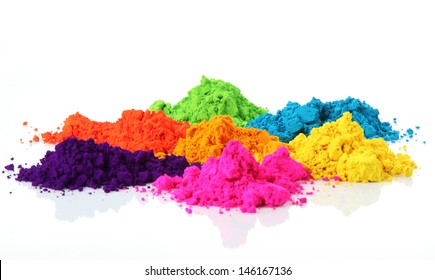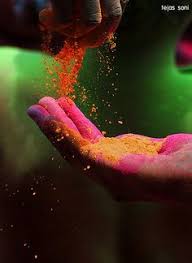Skip to main content
Holi festival

 Holi is an ancient Hindu religious festival which has become popular with non-Hindus as well in many parts of South Asia, as well as people of other communities outside Asia.In addition to India and Nepal, the festival is celebrated by Indian subcontinent diaspora in countries such as Jamaica, Suriname, Guyana, Trinidad and Tobago, South Africa, Malaysia, the United Kingdom, the United States, Canada, Mauritius, and Fiji.[6][16] In recent years the festival has spread to parts of Europe and North America as a spring celebration of love, frolic, and colours.
Holi is an ancient Hindu religious festival which has become popular with non-Hindus as well in many parts of South Asia, as well as people of other communities outside Asia.In addition to India and Nepal, the festival is celebrated by Indian subcontinent diaspora in countries such as Jamaica, Suriname, Guyana, Trinidad and Tobago, South Africa, Malaysia, the United Kingdom, the United States, Canada, Mauritius, and Fiji.[6][16] In recent years the festival has spread to parts of Europe and North America as a spring celebration of love, frolic, and colours.


 Holi celebrations start on the night before Holi with a Holika Dahan where people gather, perform religious rituals in front of the bonfire, and pray that their internal evil be destroyed the way Holika, the sister of the demon king Hiranyakashipu, was killed in the fire. The next morning is celebrated as Rangwali Holi – a free-for-all festival of colours,[10] where people smear each other with colours and drench each other. Water guns and water-filled balloons are also used to play and colour each other. Anyone and everyone is fair game, friend or stranger, rich or poor, man or woman, children, and elders. The frolic and fight with colours occur in the open streets, open parks, outside temples and buildings. Groups carry drums and other musical instruments, go from place to place, sing and dance. People visit family, friends and foes to throw coloured powders on each other, laugh and gossip, then share Holi delicacies, food and drinks. Some customary drinks include bhang (made from cannabis), which is intoxicating.[21][22] In the evening, after sobering up, people dress up and visit friends and Indian family The Holi festival has a cultural significance among various Hindu traditions of the Indian subcontinent. It is the festive day to end and rid oneself of past errors, to end conflicts by meeting others, a day to forget and forgive. People pay or forgive debts, as well as deal anew with those in their lives. Holi also marks the start of spring, for many the start of the new year, an occasion for people to enjoy the changing seasons and make new friends. The Holi festival is an ancient Hindu festival with its cultural rituals. It is mentioned in the Puranas, Dasakumara Charita, and by the poet Kālidāsa during the 4th century reign of Chandragupta II.[6] The celebration of Holi is also mentioned in the 7th-century Sanskrit drama Ratnavali.[53] The festival of Holi caught the fascination of European traders and British colonial staff by the 17th century. Various old editions of Oxford English Dictionary mention it, but with varying, phonetically derived spellings: Houly (1687),
Holi celebrations start on the night before Holi with a Holika Dahan where people gather, perform religious rituals in front of the bonfire, and pray that their internal evil be destroyed the way Holika, the sister of the demon king Hiranyakashipu, was killed in the fire. The next morning is celebrated as Rangwali Holi – a free-for-all festival of colours,[10] where people smear each other with colours and drench each other. Water guns and water-filled balloons are also used to play and colour each other. Anyone and everyone is fair game, friend or stranger, rich or poor, man or woman, children, and elders. The frolic and fight with colours occur in the open streets, open parks, outside temples and buildings. Groups carry drums and other musical instruments, go from place to place, sing and dance. People visit family, friends and foes to throw coloured powders on each other, laugh and gossip, then share Holi delicacies, food and drinks. Some customary drinks include bhang (made from cannabis), which is intoxicating.[21][22] In the evening, after sobering up, people dress up and visit friends and Indian family The Holi festival has a cultural significance among various Hindu traditions of the Indian subcontinent. It is the festive day to end and rid oneself of past errors, to end conflicts by meeting others, a day to forget and forgive. People pay or forgive debts, as well as deal anew with those in their lives. Holi also marks the start of spring, for many the start of the new year, an occasion for people to enjoy the changing seasons and make new friends. The Holi festival is an ancient Hindu festival with its cultural rituals. It is mentioned in the Puranas, Dasakumara Charita, and by the poet Kālidāsa during the 4th century reign of Chandragupta II.[6] The celebration of Holi is also mentioned in the 7th-century Sanskrit drama Ratnavali.[53] The festival of Holi caught the fascination of European traders and British colonial staff by the 17th century. Various old editions of Oxford English Dictionary mention it, but with varying, phonetically derived spellings: Houly (1687),
 Hooly (1698), Huli (1789), Hohlee (1809), Hoolee (1825), and Holi in editions published
Hooly (1698), Huli (1789), Hohlee (1809), Hoolee (1825), and Holi in editions published
after 1910
Indian Festival
 Holi is an ancient Hindu religious festival which has become popular with non-Hindus as well in many parts of South Asia, as well as people of other communities outside Asia.In addition to India and Nepal, the festival is celebrated by Indian subcontinent diaspora in countries such as Jamaica, Suriname, Guyana, Trinidad and Tobago, South Africa, Malaysia, the United Kingdom, the United States, Canada, Mauritius, and Fiji.[6][16] In recent years the festival has spread to parts of Europe and North America as a spring celebration of love, frolic, and colours.
Holi is an ancient Hindu religious festival which has become popular with non-Hindus as well in many parts of South Asia, as well as people of other communities outside Asia.In addition to India and Nepal, the festival is celebrated by Indian subcontinent diaspora in countries such as Jamaica, Suriname, Guyana, Trinidad and Tobago, South Africa, Malaysia, the United Kingdom, the United States, Canada, Mauritius, and Fiji.[6][16] In recent years the festival has spread to parts of Europe and North America as a spring celebration of love, frolic, and colours.

holi
ReplyDeletevery nise picture
ReplyDeleteNice blogger details!
ReplyDeleteit nice festival
ReplyDeleteit nice festivel
ReplyDeletenice blogger
ReplyDelete可爱的季节.
ReplyDelete